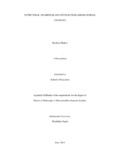
Please use this identifier to cite or link to this item:
https://hdl.handle.net/20.500.14301/262| Title: | NUTRITIONAL AWARENESS AND ITS PRACTICES AMONG SCHOOL STUDENTS |
| Authors: | Shakya, Rachana |
| Citation: | Shakya,R.(2013).Nutritional awareness and its practices among School Students. |
| Issue Date: | Jun-2013 |
| School: | SOED |
| Department: | DODE |
| Level: | M.Phil. |
| Program: | MPhil in Development Studies |
| Abstract: | As a student since my childhood and as a teacher at present, I have had lived experiences and witnessed alarming increase of the use of junk foods among the children of all levels at schools. I have foundneglected situations among the school aged groups about their nutritional food practices in the school area, at home and outside.Nepal Population Report, 2011 presents that malnutrition is a serious interruption to child survival, growth and development in Nepal.National Nutrition Policy and Strategy Report, 2011also states that school aged children especially in the government run schools are also one of the vulnerable groups to suffer from PEM problems which are also closely associated with impaired overall physical and mental development of children. During my study, I could not find any data that inform us about the nutritional status of school aged children.To understand the layers of reasons behind the awareness and practices of nutritional foods among secondary level school students from selected public and private schools, I have set two main research questions.From the rigorous ethnographic expedition of about half a year, I have explored that though parents are the main role models and caretakers, they lack awareness of developing ii good food habits in adolescents in most of cases despite their claim forcare of good food during the childhood of their children. Teachers as the real models in the school were unaware of the nutritional practices of students. In relation to school management, I observed that their main focus was on academic achievement of the students, rules were made but not followed strictly on nutritional foods as I observed low practices of nutritional foods at school. In relate to students’ nutritional awareness and practices,I found that they were aware of the nutrients like fats, carbohydrates, protein but lacked more information on vitamins and minerals which are found in common sources of other nutrients.They had high demand of a variety of foods choices. For them,it was fun to share food with friends, besides it being a basic need. They solely depended on the food provided by parents and accessed in school. They were highly influenced by the food habits of parents/teachers/peer groups/ advertisements/market foods. In relation to students’ nutritional awareness and its practices influencing participation in learning, students were found active in participating in learning activities but their attention varied depending on their nutritional food consumption. Students with active practices of good nutritional foods were found willing to come to school, ready to learn, have regular attendance and positive influences. Similarly, if emphasis is given on nutritional practices along withgood environment for learning at home and school, students become more attentive for long term. At last, Ialso observed and found that food is a metaphor of power, prestige and property in daily practices foraccess and consumption. |
| URI: | https://hdl.handle.net/20.500.14301/262 |
| Appears in Collections: | Dissertations |
Files in This Item:
| File | Description | Size | Format | |
|---|---|---|---|---|
| Nutritional Awareness_Rachana Shakya.pdf | 1.18 MB | Adobe PDF |  View/Open |
Items in DSpace are protected by copyright, with all rights reserved, unless otherwise indicated.